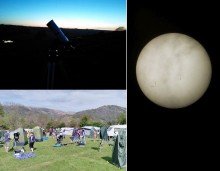I guess it’s true of any hobby, in that no matter how much you enjoy it personally, it’s always extra special when you can share what you love with like-minded others. I’ve just returned from a fantastic weekend in South Wales’ Brecon Beacons, at the Spring AstroCamp, organised by AwesomeAstronomy.com. It has to be said, I’m already counting the days until the next one (in September).
Whilst there are several star parties and public observation sessions around the country (such as the Sixpenny Handley star party, and the Wessex Astronomical Society events at Durlston Head), AstroCamp is (quite rightly, in my opinion) regarded as the friendliest of them all. There’s a central area in the campsite (the Common) where most people set up their telescopes, and everyone wanders around chatting, picking up tips, looking through telescopes, learning, sharing, and having the odd beer! I’ve learned so much from my visits there.
Sunday afternoon at AstroCamp sees everyone head to the local village hall for quizzes, talks, more beer, etc. The quiz prizes are amazing, and the talks fascinating and informative (this time the main talk was on the scientific history and importance of observing planetary/solar transits in the 18th and 19th century; whilst an additional, and very detailed, talk covered everything you need to know about Mercury itself). Everyone is welcome, no experience is required, and no-one feels left out, or foolish because of lack of knowledge …
As for the actual astronomy, well, it has to be said, the weather and seeing conditions weren’t the best this time, though I did get to see some globular and open star clusters, double stars, the Ring nebula (M57), the Whirlpool galaxy (M51), plus Jupiter, Mars and Saturn. The highlight of the weekend was, of course, the transit of Mercury on Monday afternoon. Some people had already gone home, and those who remained weren’t expecting much: the clouds had rolled in early that morning, and looked set to stay for the day. However, just as the transit was about to start (around noon), the rain stopped and the clouds parted enough for everyone to have a look at this rare and exciting phenomenon. There were lots of different scopes to look through, some using white light filters, others Hydrogen Alpha, and there was a great deal of excitement, and the atmosphere was incredible.
The reason AstroCamp is held in the Brecons is because of the national park’s internationally recognised ‘Dark Sky Status’. Although this time the weather let us down somewhat, the experience of viewing the night sky from a truly dark area is incredible. To give you an idea of what that means, I remember, on my first visit, not being able to find the Big Dipper asterism because the seven recognisable stars were lost amongst the many more, normally much dimmer, background stars!
In rural Dorset, we’re pretty lucky with our night skies, and the Cerne Valley is particularly good (hmmm … I wonder if we could get Dark Sky accreditation …). I had a wonderful session recently, when I took a small refractor to the top of Giant Hill. By midnight, the sky was actually ‘fizzing’ with stars, and I had to drag myself away so I could get up for work in the morning. Although I had my scope with me, I spent as much time just looking around at the stars, as I did looking through the telescope. Highlights of the session included probably my best ever views of the Owl Cluster in Cassiopeia and the Double Cluster in Perseus. The refractor gave near-photographic views of these fantastic objects! Also, at around midnight, Mars and then Saturn cleared the horizon, and watching them quickly rise higher was amazing!
I heartily recommend you try to get to a dark sky location on a clear night, to experience the night sky. Climb to the top of Cerne’s Giant Hill or similar dark location on a clear, moonless evening, and watch the stars come out. You’ll be astounded when the Milky Way appears, I guarantee it. A pair of binoculars will really make your night!
Speaking of binoculars, and just coming back to AstroCamp for a moment, I had my first opportunity to try a pair of Vixen SG 2.1×42 wide field binoculars. 2.1 times magnification doesn’t seem very much, but the views are truly amazing. It’s like you’ve suddenly been given a pair of new and much better eyes!
What’s up?
The moon is currently waxing in the evening, and will be full again on the 21st of May.
With Summer looming, it doesn’t get sufficiently dark for stargazing until gone 11PM. However, for those that are able to stay up late, there’s lots to see. Leo and Virgo still dominate the south, and there’s a host of galaxies to view there. Mars and Saturn rise in the Southeast around midnight, and Hercules, Lyra and Cygnus are all on show in the Northeast. I love observing in the summertime, with the Milky Way in all its splendour, and the warm temperatures go some way toward making up for the late nights …
Clear skies!
Kevin Quinn is an amateur astronomer based in Cerne Abbas. He is the proud owner of a ten-inch reflector, a small refractor, a case of eyepieces, and a couple of pairs of binoculars. He tweets via @CerneAstro, and blogs via theastroguy.wordpress.com.
©Kevin Quinn







